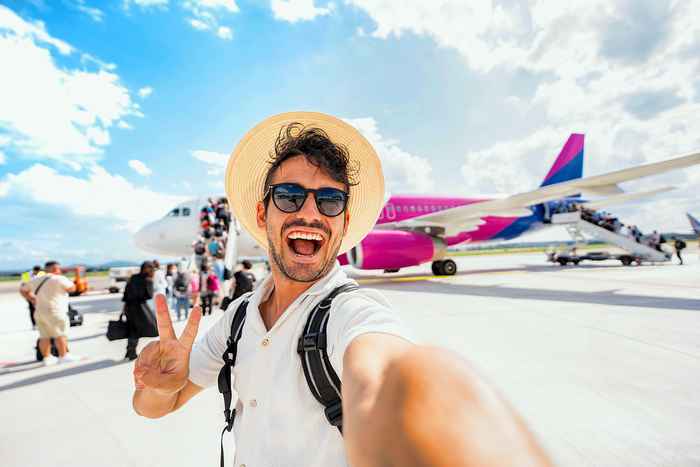How can we get people to fly less?
Amsterdam Law School
10 April 2025

The term ‘flight shame’ didn't just appear out of thin air. Since 1992, it has been clear that flying impacts our climate. On the one hand through CO2 emissions, and on the other through the white streaks that airplanes leave in the sky, known as contrails. ‘And yet in all that time, little has been done to reduce air travel. I found that striking', says Van den Berg about his doctoral research.
How polluting is flying exactly?
'Intercontinental flights are the biggest problem. About half of the fuel burned by European aircraft comes from long-haul flights. So only 6 percent of flights are responsible for the majority of emissions. Wealthy people mainly take these long flights. I don't believe a small increase in ticket prices will make much difference to that group's behaviour. Half of the Dutch population, 50 percent, did not fly last year. But some people fly a lot: 13 percent of Dutch people account for half of all flights.'

The EU has had a big hand in the success of flying
So a cheap short-haul flight to London isn’t the biggest problem?
'It is a problem because those flights are also polluting and unnecessary. But intercontinental flights remain the major concern. We should avoid long-haul holidays, such as yoga retreats in Bali, for the next 20 years. There’s no way to get to Bali without emitting CO2.'
How does the EU regulate flying?
'The EU has had a big hand in the success of flying — the EU liberalised the airline market, making cheap flights possible. Many companies have received state aid, and kerosene isn't taxed. Now, the EU is considering making tickets more expensive. That shifts the burden onto the consumer. In my dissertation, I go beyond those individual choices.'
How do you do that?
'You need to go back to the question: why do we consume? Why do we buy plane tickets? Because we're going on holiday and certain things come with that, like plane tickets, and often, swimming trunks. But there’s also a deeper meaning behind those things: the believe that sun, sea and beach are part of a holiday. When people buy a plane ticket, it is not just about the price or availability. It is about wanting to go on holiday. If going on holiday is associated with the sun, sea, and beaches, you need to fly far away in winter if you live in the Netherlands. We don't need to take fewer holidays, but we do need to change how we take them. We need to separate the idea of taking a holiday from getting on a plane.’

Do we want to use our resources for a holiday to Bali, or for heating our homes?
Aren't travel and transport part of taking a holiday?
'In fact, we’ve only been going on holiday for just over 100 years. But now, people feel entitled to go to Bali. Since 2000, air travel has become normalised — and that’s just 25 years ago. These days, if someone goes on holiday, you assume they’ve flown. That wasn’t the case when I was growing up. My research looks at how we can make flying less normal again.'
How do you make flying less normal?
'Going backpacking for a year or travelling the world is still seen as a positive, enriching experience: the further, the better. But governments can change that narrative. Flying should be treated the same as tobacco; something that was once considered cool but no longer is. Governments have stepped in to reduce smoking because it’s harmful. Raising cigarette prices alone wasn’t enough, but tackling the “cool” image did make a real difference. That started by banning advertising. Flying is extremely harmful to society. That’s why we should limit advertising and ban price stunts. But as I said, the price is not the decisive factor. People need to see that you can also have a great holiday without flying to Bali. We need to make more space for alternative ways to satisfy the desire to go on holiday.'

Train travel needs to be made more attractive. People worry about missed connections and getting stranded somewhere
What is a good alternative to a holiday in Bali?
‘It depends on what you want from your holiday. If you're looking for spirituality, you could follow one of the many pilgrimage routes across Europe. If it’s sun, sea and beach you’re after, you can take the train to France.’
Is the train a good alternative?
'It could be improved. Major railway operators have never truly focused on international travellers. Within the EU, there is a patchwork of rules and many barriers to using each other's tracks. In the last 30 years, more routes have been cancelled than introduced. It's remarkable that we've known about these issues for a long time, yet so little has changed. Train travel needs to be made more attractive. People worry about missed connections and getting stranded somewhere — and rightly so. You can't simply travel from Amsterdam to Spain on one ticket from one railway company. If you miss a connection, you're often stuck. Booking a flight is much easier than finding out which train connection works in Europe. We need more train-based package holidays — from A to B, with accommodation included. It would help if the EU required travel companies to offer train alternatives for short-haul routes. In the research project I am currently involved in, GreenPaths, we’re exploring how the EU can ensure a fair and sustainable transition.'
What if we continue to fly this much?
'Then we risk destroying our own prosperity. There's no sustainable way to fly. If we carry on like this, we’re heading for disaster. Our current policy is not working. Do we want to use our resources for a holiday to Bali, or for heating our homes? There is too little debate about such questions. The EU needs to regulate the sector more, and we must reduce how much we fly. It’s not a pleasant message, but it’s the honest truth we need to face.'